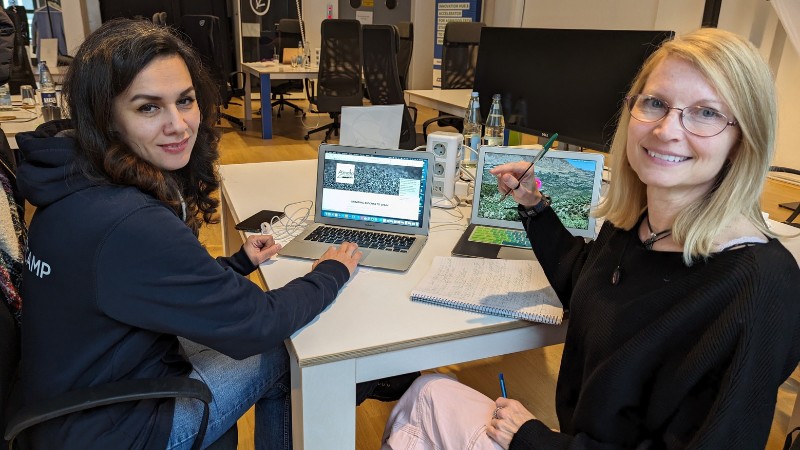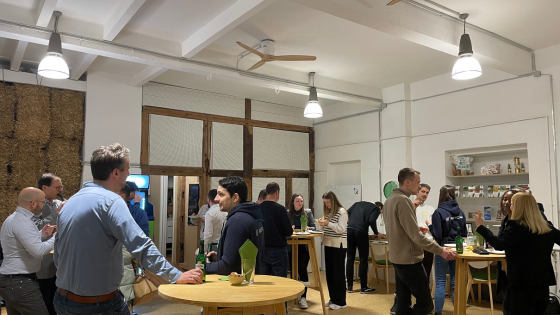NoMaze was founded straight out of university by Finn Gaida and Jean-Pascal Lutze. The Munich-based startup accelerates plant breeding research using AI. The vision at NoMaze is grounded in the belief that data should provide answers, not questions. In this interview, we explore how NoMaze, a participant in RootCamp Batch #5, tackles the challenges of plant breeding data analytics under time constraints. Learn about their innovative software solution designed to streamline the plant selection process and discover how they contribute to sustainable agriculture.
How does NoMaze's solution empower researchers and breeders?
NoMaze enables plant breeders and researchers to optimize yield and make informed decisions through a suite of specialized tools. We have developed multiple field trial analysis use cases, such as head-to-head comparisons and General Combining Ability /Specific Combining Ability analyses. These are available as user-friendly, drag-and-drop blocks in our software, simplifying complex analyses. For more advanced needs, our marker-based genomic selection tool helps model Genotype-by-Environment interactions. This feature is crucial for uncovering patterns and insights that might be hidden or challenging to find without NoMaze. It enables a deeper understanding of how genetic factors interact with environmental conditions, leading to more precise breeding decisions.
Looking to the future, we are working on predicting phenotypic values, such as yield or plant lodging, based on genetic sequences and environmental data, such as temperature. This predictive capability will be a significant milestone, allowing breeders to anticipate plant performance under various conditions, further aiding in yield optimization and informed decision-making.
What specific challenges in data analysis do researchers and breeders face?
In plant breeding, researchers and breeders often grapple with highly complex data derived from multiple sources. Addressing this challenge, our platform provides easy and intuitive tools for data visualization and handling, simplifying the complexity and allowing users to seamlessly integrate and interpret diverse data sets. Another significant challenge is the seasonal high time pressure in plant breeding. To alleviate this, the platform incorporates automation in key areas, speeding up processes and reducing manual workload. Recognizing the inefficiencies and frustrations caused by frequent back-and-forth communication between different departments, our solution offers a common communication layer and shared documents within the platform. This facilitates smoother collaboration, ensuring that all team members are on the same page and can access the information they need without delays.
Can you elaborate on the broader impact that NoMaze has on addressing key challenges in agriculture, particularly in the context of improving plant breeding processes?
NoMaze provides enhanced insights that lead to significant improvements in crop breeding. Our startup contributes to the development of crops with higher yields and reduced risk of harvest loss. This not only helps in lowering food prices but also contributes to greater stability in food supply chains. Our impact extends even further, aligning with the United Nations Sustainable Development Goals (SDGs), particularly SDG 2 (Zero Hunger) and SDG 13 (Climate Action). By improving crop yields and breeding processes, NoMaze aids in addressing global hunger challenges and supports sustainable agricultural practices that are crucial for reducing emissions and capturing carbon. Additionally, as part of the Breedfides project by the Federal Ministry of Education and Research, we are working to democratize genomic prediction. This initiative aims to make advanced genomic tools accessible to a broader range of researchers and breeders, especially in underrepresented and developing regions. By doing so, we're not only enhancing global food security but also promoting equity in the agricultural sector.
Could you share insights into the future roadmap for your startup, outlining any upcoming features or improvements?
Our upcoming roadmap includes a major design rework to enhance the user experience, making our data understanding tools more intuitive and accessible. Additionally, we're integrating machine learning predictions with our data visualizations, offering plant breeders more insights and predictive analytics alongside their genomic and phenotypic data. This integration will facilitate more informed decision-making. Moreover, we're continually expanding our use case library to address a wider range of plant breeding challenges and objectives, ensuring our platform remains versatile and highly relevant to our users' needs. These developments aim to empower plant breeders with advanced, easy-to-use tools for their research and practices.
Why did you apply for the RootCamp accelerator program?
We decided to join the RootCamp accelerator for a few key reasons. Firstly, it opens doors to an awesome network of partners in the agriculture sector. This is a big deal for us because it means more chances to collaborate and expand our reach. Secondly, having access to the investor and mentor network at RootCamp, along with their expertise and guidance, helps us. They understand what we're trying to do and can offer targeted advice to support us move forward. Lastly, the program is a great opportunity to meet other founders who are on a similar journey. It's both reassuring and holds us accountable to our goals, all while having a good time together.
If you're eager to meet Finn and Jean in person, be sure to save the date: February 7th for Batch#5's Partners & Mentors Day and RootCamp Ecosystem Party in Hannover. Don't miss out—secure your spot by registering here!
/rootcamp_logo_white_2022.png?width=2123&height=630&name=rootcamp_logo_white_2022.png)

/RC%20logo%202022.png?width=2325&height=703&name=RC%20logo%202022.png)




